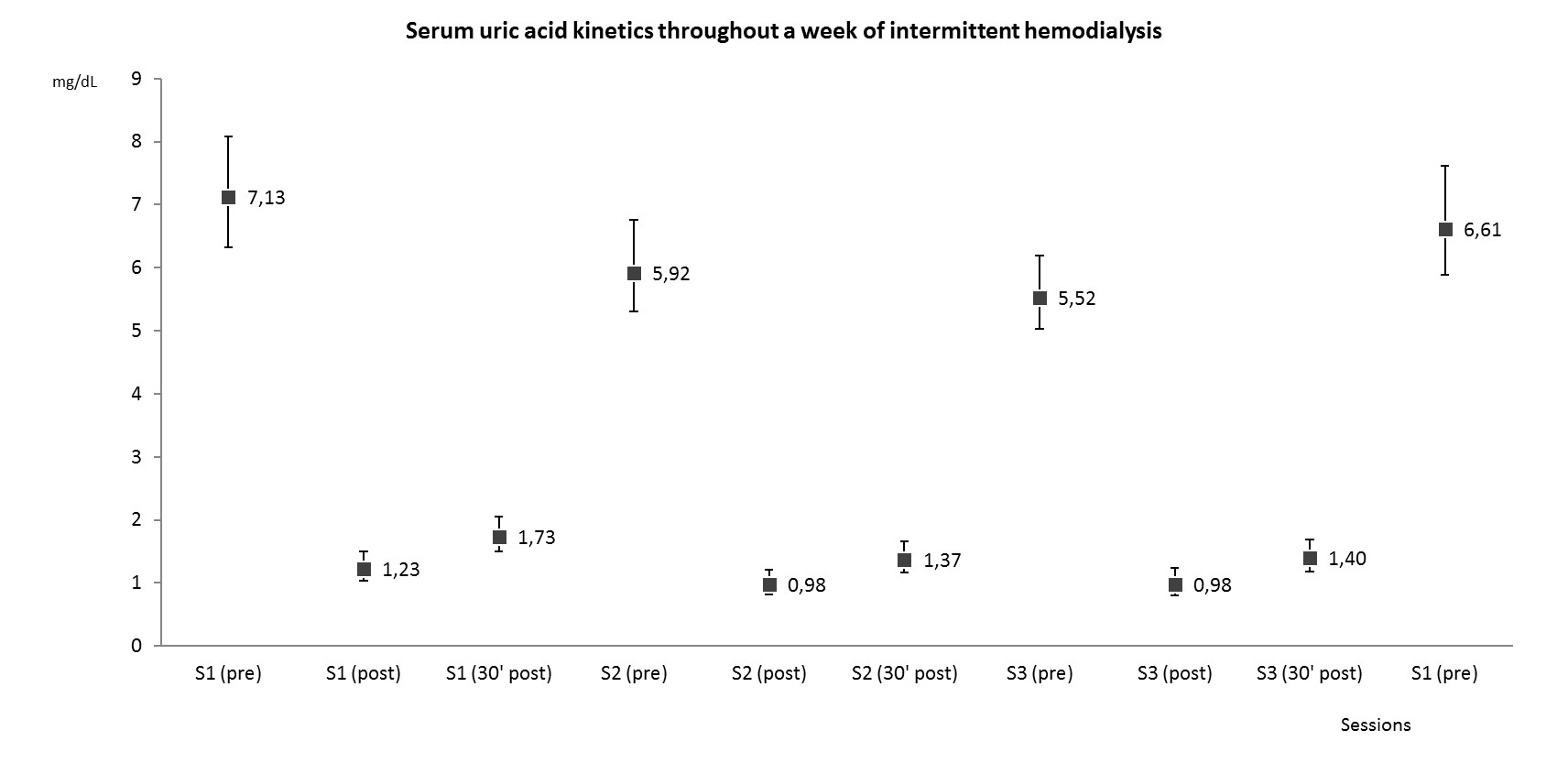Session Information
Date: Sunday, November 13, 2016
Title: Metabolic and Crystal Arthropathies - Poster I: Clinical Practice
Session Type: ACR Poster Session A
Session Time: 9:00AM-11:00AM
Background/Purpose: Gout patients often suffer from renal disease, some ultimately developing end-stage renal disease (ESRD) and requiring hemodialysis (HD) replacement therapy. Though some reports suggested that tophi disappear after HD, urate-lowering agents are frequently continued, often based on persistent high SUA levels before HD. Also, the impact of SUA levels in the survival of patients on hemodialysis (HD) is under discussion. The aim of the study was to assess the SUA reduction achieved under HD and analyze the kinetics of SUA in a week of intermittent HD.
Methods: SUA levels were determined before and after HD sessions in consecutives 96 patients with end-stage renal disease (ESRD), and compared through paired samples Student’s t test. Variables related to HD were analyzed whether associated with SUA reductions ≥80% using Student’s t test or ANOVA. Also, a kinetics study on selected 10 patients with hyperuricemia (SUA before HD> 6.8 mg/dL) throughout intermittent HD sessions in a week period was performed; differences in SUA levels were analyzed by repeated measures ANOVA.
Results: Patients were mean aged 66.5 years (SD±13.8), being 62 males (64.6%). Mean time on HD replacement was 7.1 years (±7.2). Before starting HD, 43.0% had hyperuricemia and 21.6% reported gout. Sixteen (16.4%) continued on urate-lowering agents after HD. Mean SUA levels before and after HD session was 5.2mg/dL (± 1.0) and 1.0mg/dL (±0.4), respectively. Mean SUA reduction following HD was 80.2% (95%CI 78.4-82.0); 51 patients (56.7%) showed SUA reduction ≥80%. HD-related variables Kt/v<1.3 (p=0.006) and blood efflux<400mL/min (p=0.004) significantly associated with achieving SUA reduction ≥80%. Figure shows the SUA kinetics study: SUA significantly reduced all over the period and persisted below hyperuricemia threshold (p=0.015).
Conclusion: Under HD replacement therapy SUA levels effectively reduced and persisted below saturation point, suggesting that urate-lowering therapy appears unnecessary for patients with gout and ESRD.
To cite this abstract in AMA style:
Soriano R, Andrés M, Oliveira E, Trigo C, Pascual E, Arenas MD. Serum Uric Acid Lowering Treatment Appears Unnecessary during Hemodialysis [abstract]. Arthritis Rheumatol. 2016; 68 (suppl 10). https://acrabstracts.org/abstract/serum-uric-acid-lowering-treatment-appears-unnecessary-during-hemodialysis/. Accessed .« Back to 2016 ACR/ARHP Annual Meeting
ACR Meeting Abstracts - https://acrabstracts.org/abstract/serum-uric-acid-lowering-treatment-appears-unnecessary-during-hemodialysis/

